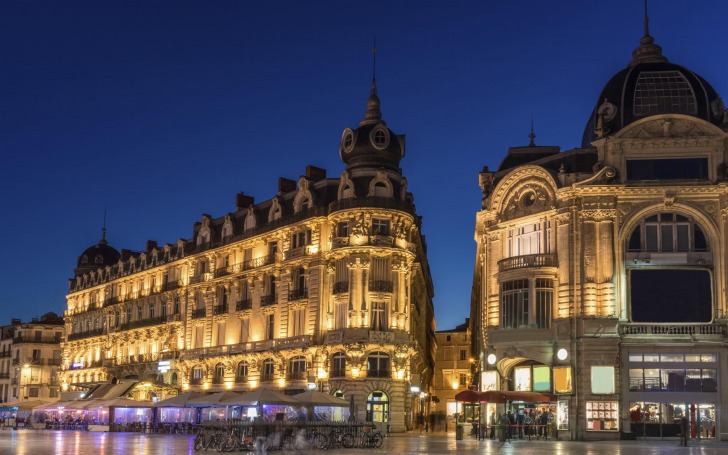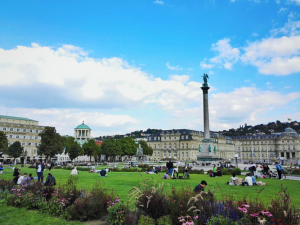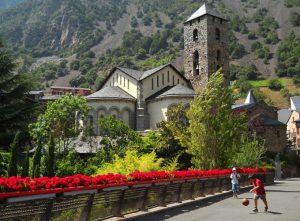 France : Safety by City
France : Safety by City
- Bordeaux
- Le Havre
- Lille
- Lyon
- Marseille
- Martinique
- Montpellier
- Nantes
- Nice
- Nimes
- Paris
- Reims
- Rennes
- Strasbourg
- Toulon
- Toulouse
Montpellier is one of the main cities in the Occitanie region in southwest France.
The city is growing very fast and there are regularly new places to see and visit.
It has the second-highest population growth rate in France after Toulouse which proves how attractive it is.
Montpellier has made a decent amount of areas pedestrian, relying on a good tram network.
The whole city center atmosphere is relaxed with plenty of places to eat at while enjoying the good Mediterranean weather.
The surroundings are also quite rich in things to do, for instance, the coast down south with loads of beaches, and nice villages up North.
Warnings & Dangers in Montpellier

OVERALL RISK: LOW
No big city is completely safe and this goes for Montpellier, too. There is a heightened risk of pickpockets and scammers, and you should remain vigilant for any suspicious activities. However, if you apply basic precaution rules, that should minimize the risk of something going wrong.

TRANSPORT & TAXIS RISK: LOW
Transportation and taxis are generally safe and reliable in Montpellier, though many pickpockets are cramming in other forms of public transport. Taxis are usually your safest bet.

PICKPOCKETS RISK: HIGH
As in any European top destination, there are pickpockets at popular tourist landmarks in Montpellier. They are your biggest worry when traveling to this city. Some pickpockets and thieves target tourists on a fairly regular basis.

NATURAL DISASTERS RISK: LOW
Montpellier is susceptible to a couple of natural hazards and disasters like floods and heatwaves. It's not too worrisome, however, since these risks aren't common.

MUGGING RISK: MEDIUM
There are low chances of getting mugged or kidnapped in this city, but there are "no-go zones" too, that should be avoided, and car theft and burglary are pretty common, too, so don't get too relaxed.

TERRORISM RISK: HIGH
Since this country has been targeted by terrorists numerous times, (as well as some countries near France, such as Denmark or Belgium) there is a reason to believe that this country can be targeted again. This is why it is important to remain aware of your surroundings at all times and report any suspicious activity.

SCAMS RISK: HIGH
As in any French city, especially a top tourist destination, there is a risk of getting scammed. Be wary of people trying to distract you or offering you unwanted help, check your change twice and always negotiate every service beforehand.

WOMEN TRAVELERS RISK: MEDIUM
Montpellier is somewhat safe to travel to if you are a female traveling solo. It's not pleasant being a woman at night in this city so apply a few general precaution rules such as not walking alone in poorly lit and deserted areas, not finding yourself in the strange company at night, etc.
So... How Safe Is Montpellier Really?
No big city is safe and this goes for Montpellier, too.
The city is mostly safe but with some dangers.
However, if you apply all basic precaution measures, your trip will probably go smoothly.
There are pickpockets and thieves on the street, both during day and night, that target tourists on a fairly regular basis.
Car theft and burglary are pretty common, and when it comes to violent crime it used to be much less common but today tends to happen from time to time.
Be careful at night especially as a woman and keep in mind that there are ‘sensitive zones’ populated by beggars and drunkards that should be avoided as much as possible.
Another major issue in France is the terrorist attacks that have been happening during the last couple of years.
Due to this, police and France’s military units are patrolling the important landmarks, train stations, and airports.
It is not uncommon and almost expected, to see armed patrols in those areas.
However, this is a good thing for tourists, since their presence scares away any pickpockets or bag snatchers that might be in the vicinity.
How Does Montpellier Compare?
| City | Safety Index |
|---|---|
| Montpellier | 48 |
| Paris | 68 |
| Le Havre | 63 |
| Rennes | 65 |
| Bordeaux | 63 |
| Martinique | 71 |
| Strasbourg | 74 |
| Deadwood (United States) | 80 |
| Sturgis (United States) | 80 |
| Pierre (United States) | 81 |
| Spearfish (United States) | 80 |
| Hill City (United States) | 83 |
| Temuco (Chile) | 31 |
Useful Information

Visas
Most countries do not need a visa in order to enter France, for any stays shorter than 90 days. Any longer than that, you might need to acquire a visa. EU nationals can stay (and work) in France for as long as they like. Make sure your passport is valid for at least six months past your planned date of return. If you are not sure about your visa status, contact your local French embassy.

Currency
Euro is the official currency for Montpellier. You can find ATMs at every airport, most train stations and on every other street corner in all towns and cities. Credit cards are widely accepted throughout the country.

Weather
In Montpellier, the climate is warm and temperate. There is more rainfall in the winter than in the summer in Montpellier. The summers are short, warm, dry, and mostly clear and the winters are long, cold, windy, and partly cloudy.

Airports
Montpellier–Méditerranée Airport, also referred to as Fréjorgues Airport, is an airport in southern France. It is located 7 km east-southeast of Montpellier.

Travel Insurance
Just like anywhere else, we recommend getting travel insurance when traveling to Montpellier, since it covers not only medical problems but also theft and loss of valuables.
Montpellier Weather Averages (Temperatures)
Average High/Low Temperature
| Temperature / Month | Jan | Feb | Mar | Apr | May | Jun | Jul | Aug | Sep | Oct | Nov | Dec |
|---|---|---|---|---|---|---|---|---|---|---|---|---|
| High °C |
11 | 12 | 15 | 18 | 22 | 26 | 29 | 28 | 25 | 20 | 15 | 11 |
| Low °C |
2 | 4 | 5 | 8 | 11 | 15 | 17 | 17 | 14 | 11 | 6 | 3 |
| High °F |
52 | 54 | 59 | 64 | 72 | 79 | 84 | 82 | 77 | 68 | 59 | 52 |
| Low °F |
36 | 39 | 41 | 46 | 52 | 59 | 63 | 63 | 57 | 52 | 43 | 37 |
France - Safety by City
| City | Safety Index |
|---|---|
| Bordeaux | 63 |
| Le Havre | 63 |
| Lille | 56 |
| Lyon | 70 |
| Marseille | 59 |
| Martinique | 71 |
| Montpellier | 48 |
| Nantes | 56 |
| Nice | 75 |
| Nimes | 65 |
| Paris | 68 |
| Reims | 68 |
| Rennes | 65 |
| Strasbourg | 74 |
| Toulon | 64 |
| Toulouse | 57 |












Not been - just asking
I’m confused that you give a safety index of 48 but say overall risk is LOW for Montpellier. But for Marseilles you give safety index 59 but overall risk is MEDIUM. So which is safer really?
Montpellier is a lot safer than Marseille.
Safe
I wouldn’t necessarily say the terrorism risk is high, especially in Montpellier. I have to travel there quite a lot but I never had to deal with something like this. Yes, the latest events happening worldwide – not only on French soil – have triggered a lot of fears regarding terrorist attack but, unfortunately, they can happen ANYWHERE.